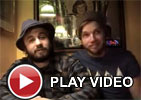Max Richter, "24 Postcards In Full Colour"
 Richter displays a hitherto unsuspected sense of humor in composing music for ring tones. This is an intriguing concept, with an apt title and short pieces that prove surprisingly wide ranging and affecting. The only flaw is that if my phone sounded this good I would be loath to interrupt any of these tracks to answer it.
Richter displays a hitherto unsuspected sense of humor in composing music for ring tones. This is an intriguing concept, with an apt title and short pieces that prove surprisingly wide ranging and affecting. The only flaw is that if my phone sounded this good I would be loath to interrupt any of these tracks to answer it.
Max Richter's The Blue Notebooks was arguably one of the touchstones of recent modern classical composition. He incorporated Tilda Swinton reading from the writing of Franz Kafka and Czeslaw Milosz into some of the tracks. Scant use of the sound of a typewriter and her oblique narration lent a human quality to pieces which, for all their melancholic beauty, might otherwise have seemed emotionally impenetrable. A similar approach informed Songs From Before where Richter achieved lower notes resembling sonic depth charges which contrasted with pieces that featured Robert Wyatt reading the words of Haruki Murakami.
Not everyone finds Max Richter enough of a challenge. The pristine sound and aching melodies leave his work open to accusations of superficiality. Such a view fails to acknowledge the admirable economy and euphoric resonance of his albums as well as their undoubted mystery. That said, it was probably time for a change and he has embraced that challenge without abandoning his core methodology. The readings are gone and except for a few tracks such as "In Louisville At 7" which playfully incorporate human chatter, there are no passages for voice. What remains are piano, strings, found sound and electronics as 24 Postcards in Full Colour uses the instruments themselves to underline Richter's mischievous desire for exploring communication and setting puzzles. With hindsight this motivation now seems evident in the earlier albums, too.
MP3s sound worse than CDs which sound worse than vinyl. So goes a popular mantra amongst people of a certain age or listening experience. I would have put Richer down as a subscriber to that view. Here though, short of tackling the problem of musical birthday cards, he goes for the jugular of the next most annoying sound currently in existence. In the process he demonstrates that ring tones don’t have to be pitiful and annoying. It's not quite the musical equivalent of, say, I.M. Pei or David Bailey designing fast food containers, but you get the picture. "A Song For H/Far Away" weaves guitar, strings, radio broadcasts, bells, and goodness knows what else into a mesmeric elegiac piece. Several piano or string dominated tracks are ideal for staring into the middle distance and imagining that the breakfast of toast and marmalade you are making is of mystical significance. Other pieces, such as "Cascade NW by W" and "Tokyo Riddle Song" are perhaps the most likely ring tones in that they are more sprightly, repetitive, and bouncy.
In the past Max Richter has assisted Future Sound of London, Roni Size and Vashti Bunyan. He has worked on Ari Folman’s animated documentary Waltz With Bashir and excerpts from The Blue Notebooks were used in the film Stranger Than Fiction. Richter begins to emerge as lacking snobbery and being as unafraid of fun as he is of intellect and commerce. That said, his creations will probably always fall on the side of restraint and good taste. The theory behind the title is that postcards used to (and to a lesser extent still do) bring messages from elsewhere. Similarly, when the phone rings it is to herald the arrival of a similar missive in a different form. Plans to incorporate audience member's cell phones into performances may already have occurred. Richter's first solo record Memory House has also just been reissued.
samples



